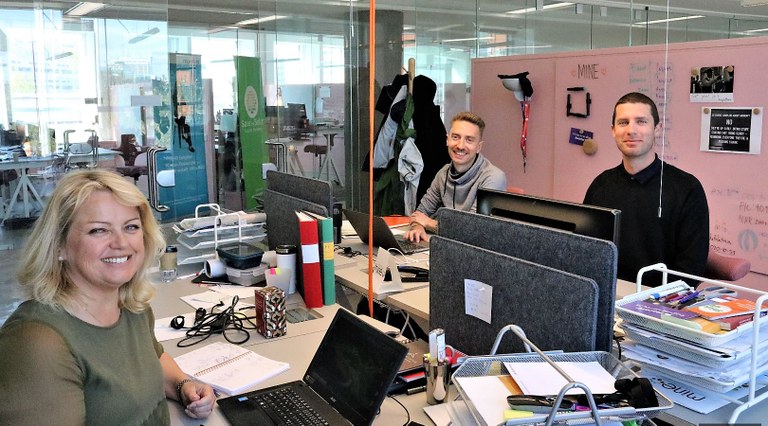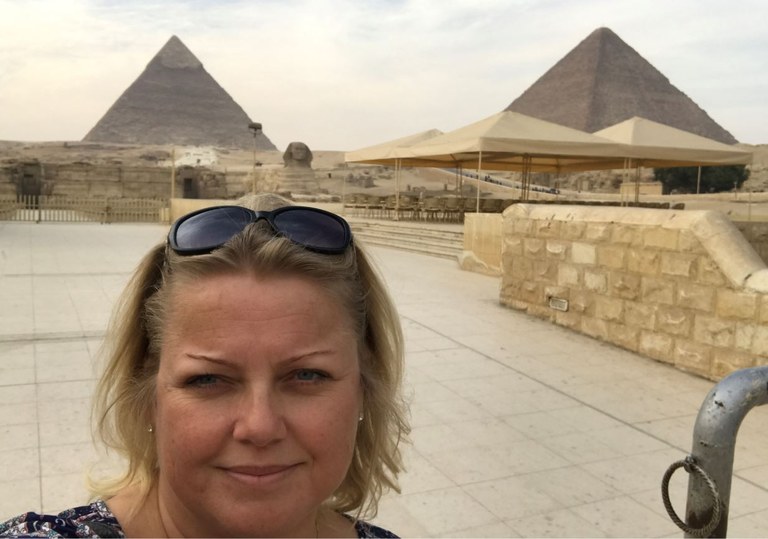Magdalena Nour: Raze barriers against international talent
Sweden lacks doctors, nurses, teachers and IT engineers, yet foreign-born job seekers struggle to access the Swedish labour market. If they make it as far as an interview, the experience often makes them feel surprise and frustration.
“They get a friendly reception but are not allowed to show their diplomas. The interviewers only want to see a one page CV. And they might be told in a slightly patronising way that they are so clever. The meeting usually ends with the employer saying they’ll let them know, but then – silence. Total silence. In a country they have got to know as equal and democratic.”
So says Magdalena Nour, Managing Director for Mine – an NGO working with “inclusive leadership to increase diversity to benefit businesses in the labour market”. Its clients are foreign-born academics.
Magdalena Nour was born and raised in Skanör Falsterbo in the south-west of Sweden. Her mother and grandfather both worked for the main Scandinavian airline, so going out into the world came natural to her.
“If you have money to spare, you travel. That’s how I was brought up.”
She has studied and worked in Cairo and worked for an international recruitment company with colleagues and clients in several countries. Today her focus is to tear down the barriers between employers and international talent.
The Nordic Labour Journal meets Magdalena Nour to find out more about the bigger journey – the one where positions move and obstacles are cleared away. All to promote a labour market where skills trump heritage.
A historic venue
We meet at Gängtappen (also known as The Threaded Pin) in Malmö. The house was built as the headquarter for Kockums, one of the world’s largest shipyards in the 1950s and 60s that employed many people of foreign heritage.
Today the house is owned by an insurance company which uses it as its regional office and shares its 14 floors with Mine and other businesses.

Magdalena Nour with colleagues Ivar Nilsson and Francois Perigault.
From here, Magdalena Nour has a view of Västra Hamnen, a rapidly expanding neighbourhood which is often used to symbolise Malmö’s transformation from an industrial to a knowledge-based city. New jobs have been created and will be created in the area, even in the face of the Corona pandemic.
“They all need skilled staff, but many employers have outdated ideas of what kind of labour force we have today,” says Magdalena Nour.
We shall come back to how she and Mine work to change these ideas, but first an insight into the interviewee’s own experience.
Links and consequences
“I have always been very interested in society. That’s why I studied political science, communication, Middle Eastern studies and Arabic at Lund University, to understand how things are linked and how this influences people.”
The studies were, of course, interspersed with travel and when Magdalena Nour figured out she could make money as a travel guide while visiting new places she took a study break and ended up in Cairo.
“I was working for a Danish travel agency and their cultural tours around Egypt, which taught me a lot about both the society and the country’s culture and literature. Suddenly I was being sucked into a more than five-thousand-year-old history.

She met her future husband in Egypt in the mid-1990s, a native who worked as what foreign correspondents call a “fixer”.
“He was the expert who could answer all the questions, fix everything I needed but did not know myself where to find, and he even solved problems whenever they arose. Nothing seemed impossible to him. In Egypt, I was the underdog and he was in charge.”
When she returned to Sweden, this time with her Egyptian husband, they not only changed countries but roles too. She was now the one who knew more and who introduced him to her and her family’s networks – with good results. After delivering newspapers for a while, he got a job at a Malmö travel agent. Today he is head of customer services at Malmö’s largest housing company.
Focus on the result
Magdalena Nour herself chose to use her interest in society to focus on the labour market. She was hired by an international recruitment agency and worked with people from the other Nordic countries and from around the world.
“We worked together in teams and you could not think that for instance a Chinese acted funny or that a Frenchman or Latin American behaved strangely. We had to deliver or risk losing the customer. You just had to enjoy the ride, also while working with people who did not speak Swedish.”
13 billion lost
As Managing Director at Mine she has realised that when she and her husband met he had the same background as many of Mine’s clients have today: He came from a well-established middle-class family, had a university degree and a high social status. He spoke English and had been working with English people and North Americans.
“In Sweden, many foreign-born people find themselves in a situation where they are overlooked because of their language, ethnicity and culture, despite having been well-established in their home countries. As if they’re not able to contribute because they can’t speak Swedish or because their nationality or mother tongue somehow influences who they are as human beings.”
Magdalena Nour says she struggles to understand this attitude, and it is also not a very rewarding one. She points to a 2018 survey carried out by the then Jusek trade union representing academics:
“Public finances could gain nearly 13 billion [kronor, €1.28bn] a year if foreign-born academics were given jobs matching their education. Today, 55,000 foreign-born academics are over-qualified for their jobs, according to a new research report done on commission from Jusek.”
Equal and democratic – and also exclusive
Both small and large Swedish municipalities lack academic workers, and at the same time it is difficult for foreign-born job seekers to find work in the Swedish labour market, points out Magdalena Nour.
It is as if their formal skills are not enough, she says, and compares the situation to the glass ceiling that has become a known metaphor in debates about gender equality. The glass ceiling must go before the job seeker can get the dream job he or she is so qualified for, and the employer gets a skilled employee.
So what is needed to crack the ceiling and create a relevant image of the labour available in the eyes of the employers?
Self-perception is a start
Magdalena Nour and her colleagues speak to many employers but rarely meet any kind of racism when talking about hiring foreign-born academics. What they do encounter is fear and a lack of knowledge. That is why Mine use an exercise where they ask employers to draw how they want their next hire to look.
“The pictures mirror the patterns we have. We want predictability and safety. Therefore the patterns are neither racist nor actively exclusive, but they are based on how our brains work. The more we know, the safer we feel.”
But before this knowledge can be used you need a level of self-perception. The first thing Magdalena Nour advises you to do is to do an online search for “Swedishness” to find out more about how Swedish norms in the labour market might look.
“There are good films made by Swedish comics who clearly and satirically highlight the crazy things we are doing. Even if much is implied it is still easy to understand for us Swedes. Impossible to understand for others.”
Another tip is to challenge yourself and to consider whether what you have always done really is the best possible way of doing it.
A third tip is training, and Mine offers this through its workshops. Bosses and other top management get the chance to take on roles with other people’s skills, and also discuss how intersectionality – “an analytical perspective to highlight how superior and subordinated relations develop and are maintained in terms of ethnicity, physical handicaps, class, gender, religion and sexuality” – determines attitudes to foreign-born job seekers.
Courage and patience both necessary
But to get new thoughts and innovations out into the open you need both courage and patience. As well as time. Magdalena Nour again draws a parallel between the development of gender equality and changes to what is considered to be a good employee.
“We don’t notice the slow changes. Women used to be shut out from certain positions in our society, now gender no longer plays a part in traditionally male-dominated occupations like doctor or priest."
The inclusion that Magdalena Nour is working for is summed up in Mine’s main motto: Letting business advantages, social advantages and company advantages go hand in hand.
“Employers must dare to face the challenges if they are to benefit from the advantages of inclusive leadership. That way you get a win-win-win situation and things can go as far as you want them. But this does not happen by itself.”
And with those words ends the interview with Magdalena Nour in the house from where Kockums has shipped many vessels far, far out into the world.
- Four categories
-
Magdalena Nour can divide Mine’s clients – foreign-born academics – into four main categories when it comes to their reasons for ending up in Sweden.
“We call them the followers, the students, the refugees and the love refugees.
- The followers – partners of specialists who are recruited to smaller and larger companies in the region and who are also often highly educated.
- The students – those who arrive in the Öresund region to study in English at universities in Malmö, Lund or Copenhagen, and who then want to stay.
- The refugees – people with refugee status and therefore permission to stay in Sweden for three years, which can turn permanent.
- Love refugees – Swedes’ and often Danes’ foreign partners cannot settle in Denmark according to that country’s rules, but they can settle in Sweden.
“And when they do, they become Öresund commuters because love knows no borders at all,” says Magdalena Nour.
 Follow us on Facebook
Follow us on Facebook
